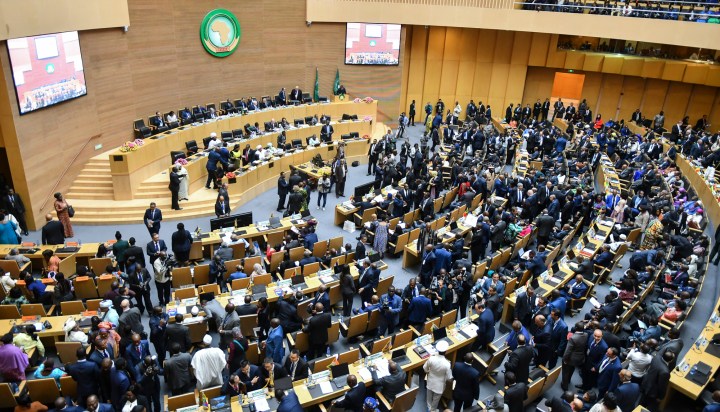ISS TODAY
Connecting African citizens with African decisions

The African Union needs to prove its commitment to the continent’s people by showing that multilateralism matters.
First published by ISS Today
To be effective, the African Union (AU) needs to become more accessible, responsive and relevant to the average African citizen. This means we need more information about and involvement in the AU’s decision-making processes. The AU summit on 6 and 7 February is an opportunity to remind Africa’s leaders of that.
Member states gathered at the summit will no doubt reflect on their responses to the Covid-19 pandemic and the African Continental Free Trade Area which was launched on 1 January this year. They’re also expected to discuss the implementation of the AU Commission’s long-awaited structural reforms and elect new AU Commission leaders.
Heads of state should use this summit to discuss the importance of multilateral institutions in Africa and the continent’s quest to make them more effective. By pooling ideas, goals and resources, multilateralism and its institutions can make a vital contribution to the continent’s future.
Regional Director of the Institute for Security Studies’ (ISS) Addis Ababa office, Roba Sharamo, says the AU event provides an opportunity for the AU Commission to become more fit for purpose and responsive to Africa’s needs.
When member states are invested in achieving specific outcomes, multilateral institutions work better and can benefit the citizens of the countries involved. Bodies like the AU provide expertise and guidance in norm-setting and encourage states to implement decisions taken. In 2020 for example, African states identified collective responses to Covid-19 that might prevent the continent being left behind in the global rush for medical equipment and vaccines.
Continental-level Covi-19 initiatives are a good reminder that African citizens should be the main beneficiaries of multilateral institutions. But the voices of ordinary people are still largely absent in discussions at the AU level.
Liesl Louw-Vaudran, ISS Senior Researcher, says there isn’t enough interaction between the AU and civil society. Despite the spaces that have been opened for increased virtual communication in response to Covid-19, the 2021 AU summit agenda still largely reflects the priorities of governments. There’s little space for civil society to raise its views and voices in the continental decision-making process.
Being inclusive is not easy for a bureaucracy. To achieve tangible outcomes, organisations like the AU have to overcome complex decision-making processes involving the interests of many governments. Institute for Global Dialogue Executive Director, Dr Philani Mthembu, said at an ISS seminar in late January that “multilateral institutions are as strong as their member states are willing to make them.”
Describing the power of multilateral bodies, political expert Prof Thomas Tieku notes that policy influence is not only achieved by the countries that make up intergovernmental organisations like the AU. Individuals like the AU Commission staff also play an important and often overlooked role.
For instance, since 2002, AU Commission staff in Addis Ababa and in the field have developed many policy guidelines, strategies and responses on diverse issues such as peace operations, mediation, and post-conflict reconstruction and development. When commissioners, the chairperson or their representatives engage in mediation, political advice and good offices in countries such as Madagascar, Sudan or Central African Republic, the AU is complementing the role of its member states.
Tieku goes on to explain that external actors who aren’t members of multilateral organisations, can also have an influence on the daily affairs of these bodies. Relying on such actors has been a sore point for many followers of AU debates, particularly when it comes to the AU’s dependency on external funding.
Part of the rationale for UN Security Council debates about predictable and sustainable funding for the AU is that a dependence on external funding will limit the AU’s ability to shape its own future. This has been an important driver for revitalising the AU Peace Fund in recent years.
Debates about external influence have sometimes exposed the AU to global geostrategic rivalries. For instance, the process of establishing the Africa Centres for Disease Control and Prevention (Africa CDC) last year generated some debate. While China’s contribution to building the Africa CDC headquarters was welcomed by the AU Commission, it was criticised by countries such as the United States for potentially bypassing AU member states in its decision.
Governments, multilateral bodies and external actors don’t operate in isolation from each other, and all have a vital role to play in achieving development and stability in Africa. Organisations like the AU are not passive agents in decision-making processes, and often have more influence than we give them credit for. But the AU needs to prove its commitment to the continent’s people by showing that multilateralism matters, not only for member states in high-level discussions but for its citizens. DM
Gustavo de Carvalho, Senior Researcher, Peace Operations and Peacebuilding, ISS Pretoria
Information pertaining to Covid-19, vaccines, how to control the spread of the virus and potential treatments is ever-changing. Under the South African Disaster Management Act Regulation 11(5)(c) it is prohibited to publish information through any medium with the intention to deceive people on government measures to address Covid-19. We are therefore disabling the comment section on this article in order to protect both the commenting member and ourselves from potential liability. Should you have additional information that you think we should know, please email [email protected]

















 Become an Insider
Become an Insider
Comments - Please login in order to comment.